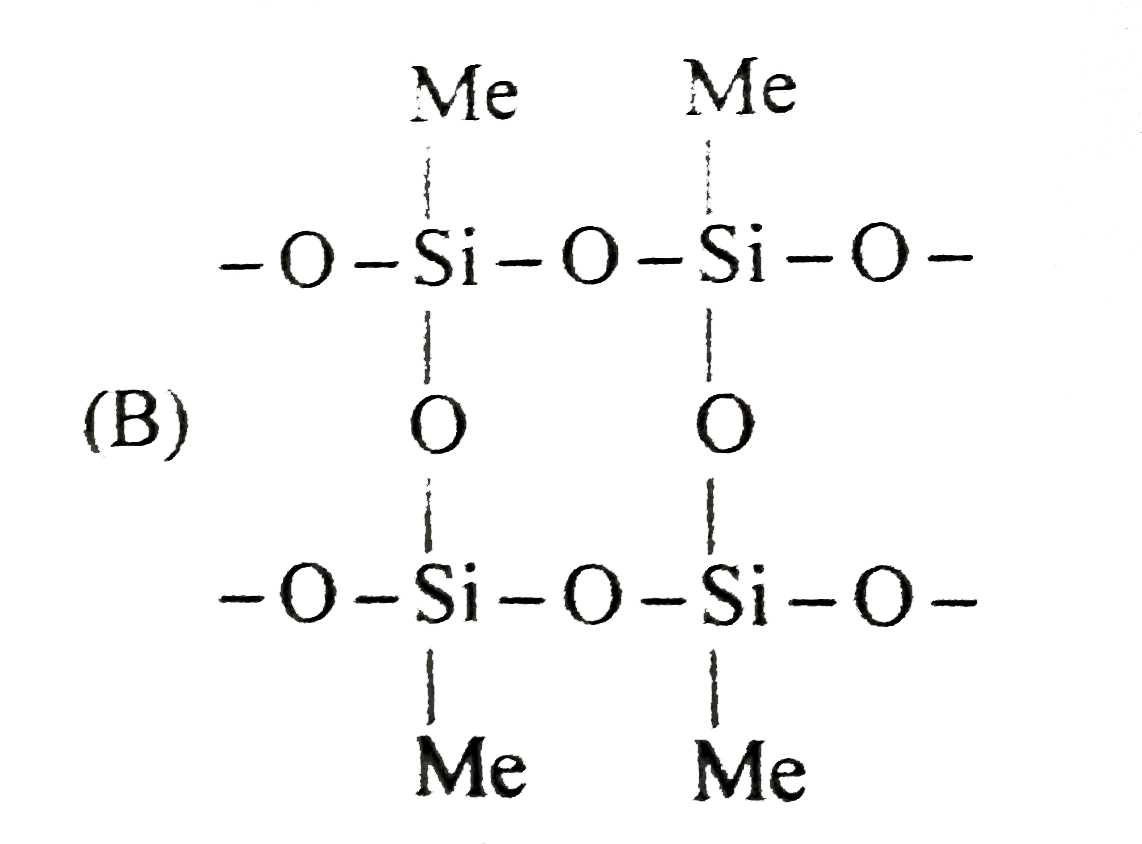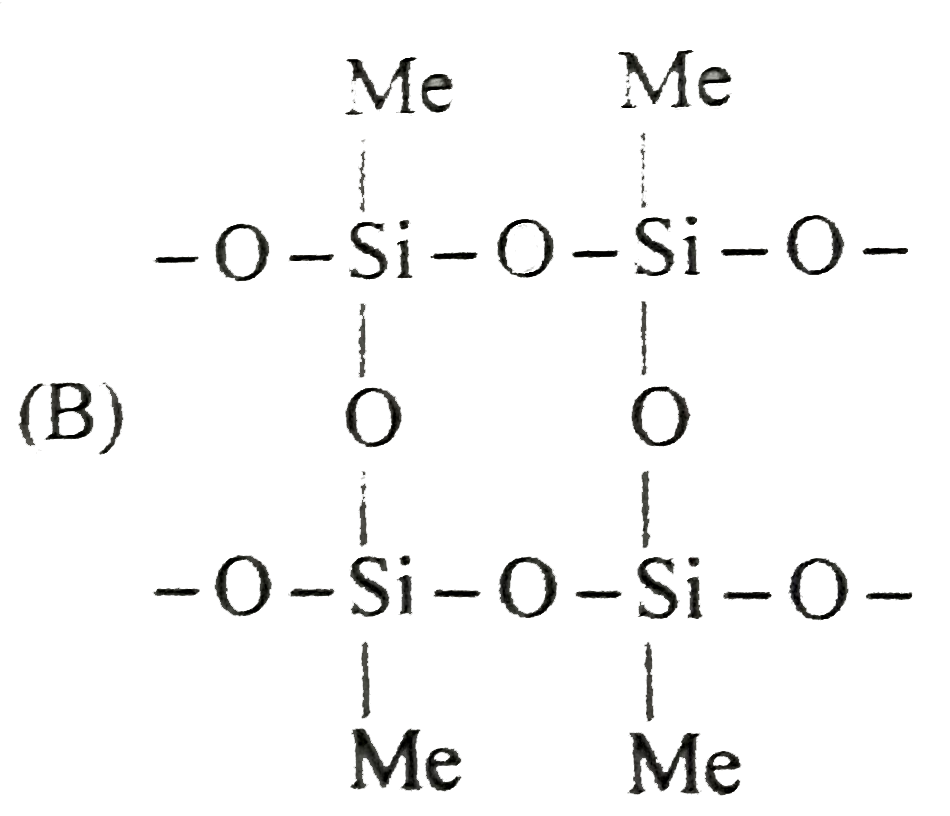Read the following write-ups and answer the questions at the end of it.
Silicons are synthetic polymers containing repeated unit. Since, the imperical formula of a ketone , the name silicone has been given to this materials. silicons can be made into oils, rubberly elastamors and resins. They find a variety of applications because of their chemical inertness,water repelling nature, heat-resistence and good electrical insulating property.
Commercial silicone polymers are usally methyl derivatives and to lesser a extent phenyl derivatives and are synthesised by the hydrolysis of
[R =methyl (Me) or phenyl ]
If we start with as the starting material, silicons formed is :

Noth of the above
None of the above
The correct Answer is:B
If we sttart with as the starting material, cross link silicones is formed.
Topper's Solved these Questions
- P BLOCK ELEMENTSBOOK - BANSALCHAPTER - P BLOCK ELEMENTSEXERCISE - Exercise 3
20 Videos
- P BLOCK ELEMENTSBOOK - BANSALCHAPTER - P BLOCK ELEMENTSEXERCISE - Exercise 1
27 Videos
- NITROGEN COMPOUNDSBOOK - BANSALCHAPTER - NITROGEN COMPOUNDSEXERCISE - EXERCISE-4 (Section-4) SECTION -B( JEE Main Previous Question )
5 Videos
- RADIO ACTIVITYBOOK - BANSALCHAPTER - RADIO ACTIVITYEXERCISE - Exercise-4
12 Videos
Similar Questions
Silicones are synthetic polymers containing repeated R2SiO units . Since the empirical formula is that of a ketone (R2CO), the name Silicone has been given to these materials . Silicone can be made into oils , rubbery elastomers and resins . They find a variety of applications because of their chemical inertness , water repelling nature, heat resistance and good electrical insulating property .
Commerically silicon polymers are usually synthesised by the hudrolysis of
R2SiCl2[R=Methyl(Me)orphenyl(ϕ)]
 .
.
If we start with SiMeCl3 as the starting material silicones formed is :
View SolutionSilicones are sunthetic polyners conitainging repeated R2SiO units . Since the empirical formula is that of a ketone (R2CO), the name Silicone has eeen given to these materils . Siliconse can be makde intio oils , rubbery eleastomers and resins . They find a varely of appoications because of their chemical inctness , water repelling nature m heat resistance and good electical insulationg property .
Commerical silicon polumers are usuallly metghly synthesised by the hudroluysis of
R2SiCl2[R=Methyl(Me)orphenyl(ϕ)]
 .
.
If we mix SiMe3Cl with SiMe2Cl2 , we get silicones of the type .
View Solution
Knowledge Check
Read the following write-ups and answer the questions at the end of it.
Silicons are synthetic polymers containing repeated R2SiO unit. Since, the imperical formula of a ketone (R2CO), the name silicone has been given to this materials. silicons can be made into oils, rubberly elastamors and resins. They find a variety of applications because of their chemical inertness,water repelling nature, heat-resistence and good electrical insulating property.
Commercial silicone polymers are usally methyl derivatives and to lesser a extent phenyl derivatives and are synthesised by the hydrolysis of
R2SiCl2 [R =methyl (Me) or phenyl (ϕ)]
Me2SiCl2H2O−−→O−Me∣Si∣Me−O−Me∣Si∣Me−O−Me∣Si∣Me−O−
If we mixMe3SiCl with Me2SiCl2, we get silicones of the typeAMe−Me∣Si∣Me−O−Me∣Si∣Me−O−Me∣Si∣Me−O−Me∣Si∣Me−MeB Cboth of the aboveDnone of the above
Cboth of the aboveDnone of the aboveRead the following write-ups and answer the question at the end of it.
Silicones are synthetic polymers containing repeated R2SiO units. Since, the empirical formula is that of a ketone (R2CO) , the name silicone has been given to these materials. Silicones can be made into oils, rubbery elastomers and resins. They find a variety of applications because of their chemical inertness, water repelling nature, heat-resistance and good electrical insulating property. Commerical silicon polymers are usually methyl derivatives and to a lesser extent phenyl derivatives and are synthesised by the hydrolysis of
R2SiCl2[R=methyl (Me) or phenyl(ϕ)]
Me2SiCl2H2O−−→O−Me∣Si∣Me−O−Me∣Si∣Me−O−Me∣Si∣Me−O
If we start with MeSiCl3 as the starting material, silicones formed is :A B
B CBoth of the aboveDNone of the above
CBoth of the aboveDNone of the aboveRead the following write-ups and answer the question at the end of it.
Silicones are synthetic polymers containing repeated R2SiO units. Since, the empirical formula is that of a ketone (R2CO) , the name silicone has been given to these materials. Silicones can be made into oils, rubbery elastomers and resins. They find a variety of applications because of their chemical inertness, water repelling nature, heat-resistance and good electrical insulating property. Commerical silicon polymers are usually methyl derivatives and to a lesser extent phenyl derivatives and are synthesised by the hydrolysis of
R2SiCl2[R=methyl (Me) or phenyl(ϕ)]
Me2SiCl2H2O−−→O−Me∣Si∣Me−O−Me∣Si∣Me−O−Me∣Si∣Me−O
If we mix Me3SiCl with Me2SiCl2, we get silicones of the type:A B
B CBoth of the aboveDNone of the above
CBoth of the aboveDNone of the above
Write the empirical formula of a silicone.
View SolutionSilicones are water repelling in nature due to.
View SolutionSilicones are sunthetic polyners conitainging repeated R2SiO units . Since the empirical formula is that of a ketone (R2CO), the name Silicone has eeen given to these materils . Siliconse can be makde intio oils , rubbery eleastomers and resins . They find a varely of appoications because of their chemical inctness , water repelling nature m heat resistance and good electical insulationg property .
Commerical silicon polumers are usuallly metghly synthesised by the hudroluysis of
R2SiCl2[R=Methyl(Me)orphenyl(ϕ)]
 .
.
If we strt with SiMeCl3 as the starting material silicones formed is :
View SolutionSilicones are sunthetic polyners conitainging repeated R2SiO units . Since the empirical formula is that of a ketone (R2CO), the name Silicone has eeen given to these materils . Siliconse can be makde intio oils , rubbery eleastomers and resins . They find a varely of appoications because of their chemical inctness , water repelling nature m heat resistance and good electical insulationg property .
Commerical silicon polumers are usuallly metghly synthesised by the hudroluysis of
R2SiCl2[R=Methyl(Me)orphenyl(ϕ)]
 .
.
If we mix SiMe3Cl with SiMe2Cl2 , we get silicones of the type .
View SolutionSilicones are water repelling in nature because-
View Solution
